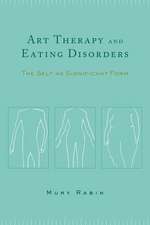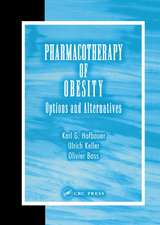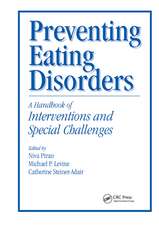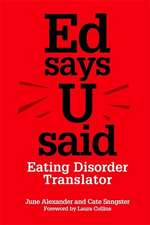A Collaborative Approach to Eating Disorders
Editat de June Alexander, Janet Treasureen Limba Engleză Paperback – 25 iul 2011
A Collaborative Approach to Eating Disorders draws on up-to-date evidence based research as well as case studies and clinical vignettes to illustrate the seriousness of eating disorders and the impact on both the sufferer and their loved ones. Areas of discussion include:
- current research including genetic factors, socio-cultural influences and early intervention
- clinical applications such as family based dialectical and cognitive behavioural treatments
- treatment developments for both adolescents and adults with a range of eating disorders
- building collaborative alliances at all levels for treatment and ongoing recovery.
| Toate formatele și edițiile | Preț | Express |
|---|---|---|
| Paperback (1) | 440.54 lei 6-8 săpt. | |
| Taylor & Francis – 25 iul 2011 | 440.54 lei 6-8 săpt. | |
| Hardback (1) | 1046.66 lei 6-8 săpt. | |
| Taylor & Francis – 26 iul 2011 | 1046.66 lei 6-8 săpt. |
Preț: 440.54 lei
Preț vechi: 463.72 lei
-5% Nou
Puncte Express: 661
Preț estimativ în valută:
84.30€ • 86.97$ • 70.35£
84.30€ • 86.97$ • 70.35£
Carte tipărită la comandă
Livrare economică 26 martie-09 aprilie
Preluare comenzi: 021 569.72.76
Specificații
ISBN-13: 9780415581462
ISBN-10: 041558146X
Pagini: 344
Ilustrații: 4 tables and 15 line drawings
Dimensiuni: 156 x 234 x 20 mm
Greutate: 0.64 kg
Ediția:New.
Editura: Taylor & Francis
Colecția Routledge
Locul publicării:Oxford, United Kingdom
ISBN-10: 041558146X
Pagini: 344
Ilustrații: 4 tables and 15 line drawings
Dimensiuni: 156 x 234 x 20 mm
Greutate: 0.64 kg
Ediția:New.
Editura: Taylor & Francis
Colecția Routledge
Locul publicării:Oxford, United Kingdom
Public țintă
Postgraduate, Professional, Professional Practice & Development, and UndergraduateCuprins
Katzman, Foreword. Part I: Understanding Risk and Resilience for Eating Disorders. Arnold, Introduction. Konstantellou, Campbell, Eisler, The Family Context: Cause, Effect or Resource. Treasure, Kanakam, The Links Between Genes and the Environment in the Shaping of Personality. Kaye, Bailer, Klabunde, Neurobiology Explanations for Puzzling Behaviours. Zucker, Moskovich, Vinson, Watson, Emotion and Empathic Understanding: Capitalizing on Relationships in Those with Eating Disorders. Paxton, Modifiable Risk Factors that Can Be Translated into Prevention or Resilience. Dove, Byrne, Obesity and Eating Disorders. Part II: Treatment. Collins Lyster-Mensh, Introduction. Birmingham, Physical Effects of Eating Disorders. Hart, Williams, Wakefield, Russell, The Role of Nutrition. David, Broft, Walsh, Pharmacotherapy of Eating Disorders. Wade, Watson, Psychotherapies in Eating Disorders. Hoste, Celio-Doyle, Le Grange, Families as an Integral Part of the Treatment Team: Treatment Culture and Standard of Care Challenges. Milstein, Arnold, Effectively Engaging the Family in Treatment. Goddard, Raenker, Treasure, Involving Carers: A Skills-based Learning Approach. Evans, Waller, The Therapeutic Relationship in Cognitive Behavioural Therapy for Adults with Eating Disorders. Federici, Wisniewski, Integrating Dialectical Behaviour Therapy and Family Based Treatment for Multidiagnostic Adolescent Patients. Bulik, Baucom, Kirby, Couples Therapy for Anorexia Nervosa. Olmsted, Carter, Pike, Relapse Prevention. Part III: Clinical Presentations. van Furth, Introduction. Doyle, Smyth, Le Grange, Childhood and Adulthood: When Do Eating Disorders Start and Do Treatments Differ? Madden, Recognising and Diagnosing Early Onset of Eating Disorders. O’Toole, Food Phobia and Functional Dysphagia. Claudino, Morgan, Unravelling Binge Eating Disorder. Gilbert, Eating Disorders in African American Women. Sundgot-Borgen, Bratland-Sanda, Eating Disorders and Athletes. Morgan, Male Eating Disorders. Part IV: Changing the Culture. Vickery, Introduction. Von Ranson, Laverty, Narrowing the Psychotherapy Research-practice Gap. Ringwood, Why Carers Need to Know about Research. Grefe, Promote Full Agenda of Rights. Tantillo, The Patient-Family-Clinician-Researcher Quest for Quality Care.
Recenzii
"Professionals and families need to work together to help people with eating disorders. This book tells us why this is true and offers specific strategies to make it happen. This is a terrific book and long overdue!" - James Lock, Stanford University, California, USA
"The aim of this enthusiastic book is to integrate treatments from a wide range of professional and lay experts who have learned how best to treat persons with eating disorders. The model for family therapy has taught us how to mobilize parental help and this approach can now be extended to enlist contributions from carers, partners and recovered patients themselves. This book is a cornucopia of treatment ideas and should be read by those who strive to help sufferers from eating disorders." - Gerald Russell, Maudsley Hospital, London, UK
"Professionals and families need to work together to help people with eating disorders. This book tells us why this is true and offers specific strategies to make it happen. This is a terrific book and long overdue!" - James Lock, Stanford University, California, USA
"The aim of this enthusiastic book is to integrate treatments from a wide range of professional and lay experts who have learned how best to treat persons with eating disorders. The model for family therapy has taught us how to mobilize parental help and this approach can now be extended to enlist contributions from carers, partners and recovered patients themselves. This book is a cornucopia of treatment ideas and should be read by those who strive to help sufferers from eating disorders." - Gerald Russell, Maudsley Hospital, London, UK
"Students and early career and seasoned professionals alike will benefit from the up to date review of eating disorders etiology, treatment, and prevention contained in this volume. But, more importantly, readers will be inspired by the model the book presents for respectful, effective collaboration among researchers, practitioners, families, support, and advocacy specialists, and those who have had eating disorders." - Judith Banker, Eating Disorders: The Journal of Treatment and Prevention, Volume 20, Issue 2, 2012
"The aim of this enthusiastic book is to integrate treatments from a wide range of professional and lay experts who have learned how best to treat persons with eating disorders. The model for family therapy has taught us how to mobilize parental help and this approach can now be extended to enlist contributions from carers, partners and recovered patients themselves. This book is a cornucopia of treatment ideas and should be read by those who strive to help sufferers from eating disorders." - Gerald Russell, Maudsley Hospital, London, UK
"Professionals and families need to work together to help people with eating disorders. This book tells us why this is true and offers specific strategies to make it happen. This is a terrific book and long overdue!" - James Lock, Stanford University, California, USA
"The aim of this enthusiastic book is to integrate treatments from a wide range of professional and lay experts who have learned how best to treat persons with eating disorders. The model for family therapy has taught us how to mobilize parental help and this approach can now be extended to enlist contributions from carers, partners and recovered patients themselves. This book is a cornucopia of treatment ideas and should be read by those who strive to help sufferers from eating disorders." - Gerald Russell, Maudsley Hospital, London, UK
"Students and early career and seasoned professionals alike will benefit from the up to date review of eating disorders etiology, treatment, and prevention contained in this volume. But, more importantly, readers will be inspired by the model the book presents for respectful, effective collaboration among researchers, practitioners, families, support, and advocacy specialists, and those who have had eating disorders." - Judith Banker, Eating Disorders: The Journal of Treatment and Prevention, Volume 20, Issue 2, 2012





















